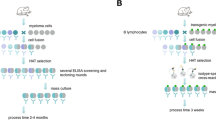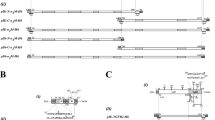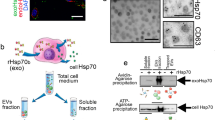Abstract
Eukaryotic host cells co-transfected with a human growth hormone gene (hGH) under the control of the promoter of the human 70,000 Mr heat shock protein (hsp70) gene, and with the human harvey ras oncogen, were expanded as tumours after inoculation into selected warmblooded animals. Upon stressing the animals, employing controlled whole body heat, gene expression occurs, and hGH protein can be detected in the blood stream of the animals. In addition, in response to the secretion of the newly synthesized protein after induction, non-genetically immunodeficient animals produce antibodies over a period of four weeks, able to compete monoclonal antibodies, or to immunoprecititate the hGH produced by the parental cells. This approach represents a simple method for the direct production in vivo of a given gene product, as well as polyclonal antibodies directed against it. Moreover, it offers a general method of primary immunization with an engineered gene product.
This is a preview of subscription content, access via your institution
Access options
Subscribe to this journal
Receive 12 print issues and online access
$209.00 per year
only $17.42 per issue
Buy this article
- Purchase on Springer Link
- Instant access to full article PDF
Prices may be subject to local taxes which are calculated during checkout
Similar content being viewed by others
References
Ritossa, F. 1962. A new puffing pattern induced by temperature shock and DNP in Drosophila. Experimentia 18:571–573.
Schlesinger, M., Ashburner, M., and Tissières, A. 1982. Heat Shock from Bacteria to Man, Cold Spring Harbor Laboratory, Cold Spring Harbor, NY.
Voellmy, R. 1984. The heat shock genes: A family of highly conserved genes with a superbly complex expression. Bioessay 1:213–217.
Bardwell, J.C. and Craig, E.A. 1984. Major heat shock genes of Drosophila and Escherichia coli heat-inducible dnaK gene are homologous. Proc. Natl. Acad. Sci. U.S.A. 81:848–852.
Voellmy, R., Ahmed, A., Schiller, P., Bromley, P. and Rungger, D. 1985. Isolation and functional analysis of a human 70,000-dalton heat shock protein gene segment. Proc. Natl. Acad. Sci. U.S.A. 82:4949–4953.
Nover, L. 1987. Expression of heat shock genes in homologous and heterologous systems. Enzyme Microb. Technol. 9:129–144.
Dreano, M., Fouillet, X., Brochot, J., Vallet, J.-M., Michel, M.-L., Rungger, D., and Bromley, P. 1986. High-level, heat-regulated synthesis of proteins in eukaryotic cells. Gene 49:1–8.
Dreano, M., Brochot, J., Myers, A., Cheng-Meyer, C., Rungger, D., Voellmy, R., and Bromley, P. 1987. Heat-regulated expression of the hepatitis B virus surface antigen in the human Wish cell line. Virus Res. 8:43–59.
Tabin, C.J., Bradley, S.M., Bargmann, C.I., Weinberg, R.A., Papageorge, A.G., Scolnick, E.M., Dhar, R., Lowry, D.R., and Chang, E.H. 1982. Mechanism of activation of a human oncogene. Nature 300:143–149.
Dreano, M., Fischbach, M., Moutandou, F., Salina, C., Padieu, P. and Bromley, P. Production of secretable proteins using the passage in vivo as tumours of cells carrying heat-inducible expression constructs. 1988. Bio/Technology 6:953–958.
Bjorck, L. and Kronvall, G. 1984. Purification and some properties of streptococcal protein G, a novel IgG-binding reagent. J. Immunol. 133:969–974.
Sugimoto, K. 1980. Procedure for the production of human insulin. Japanese Patent Application No. 104726.
Oliff, A., Defeo-Jones, D., Boyer, M., Martinez, D., Kiefer, D., Vuocolo, G., Wolfe, A., and Socher, S.H. 1987. Tumors secreting human TNF/cachectin induce cachexia in mice. Cell 50:555–563.
Seden, R.F., Skoskiewicz, M.J., Howie, K.B., Russell, P.S., and Goodman, H.M. 1987. Implantation of genetically engineered fibro-blasts into mice: Implications for gene therapy. Science 236:714–718.
Wagner, E.F., Covarrubias, L., Stewart, T.A., and Mintz, B. 1983. Prenatal lethalities in mice homozygous for human growth hormone gene sequences integrated in the germ line. Cell 35:647–655.
Hammer, R.E., Palmiter, R.D. and Brinster, R.L. 1984. Partial correction of murine hereditary growth disorder by germline incorpo ration of a new gene. Nature 311:65–67.
Delpeyroux, F., Chenciner, N., Lim, A., Blondel, B., Crainic, R., vander Werf, S., and Streeck, R.E. 1986. Poliovirus neutralization epitope expressed on hybrid hepatitis B surface antigen particles. Science 233:472–475.
Laemmli, U.K. 1970. Cleavage of structural proteins during the assembly of the head of bacteriophage T4. Nature 227:680–685.
Author information
Authors and Affiliations
Rights and permissions
About this article
Cite this article
Dreano, M., Marq, JB. & Bromley, P. Antibody Formation Against Heat-Induced Gene Products Expressed in Animals. Nat Biotechnol 6, 1340–1343 (1988). https://doi.org/10.1038/nbt1188-1340
Received:
Accepted:
Issue Date:
DOI: https://doi.org/10.1038/nbt1188-1340



